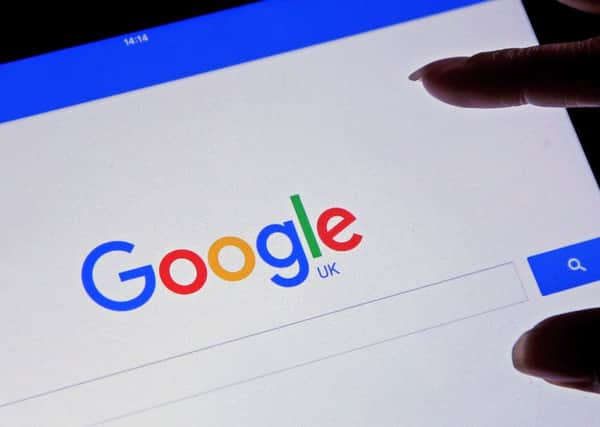Andrew Vine: Why I will boycott Google until it does the right thing and pays a fair amount of tax


It won’t be clicked on or used to search, and neither will any of its offshoots such as YouTube. If that means a degree of inconvenience, then so be it. The actions of a single individual are not remotely likely to worry this giant multi-national corporation, but I suspect I’m not alone.
As anger grows over the derisory amount Google has paid in tax, my hunch is that more and more people are going to boycott its services. That general sense of unfairness at the financial sleight-of-hand with which Google has seemingly effortlessly bamboozled the UK taxman only intensified yesterday with the unveiling of annual figures guaranteed to make its shareholders rub their hands in glee.
Advertisement
Hide AdAdvertisement
Hide AdGoogle unveiled record profits of more than £11bn – an increase of £1bn on the previous year – leaving it poised to overtake Apple as the world’s biggest company by market value.
The eye-watering scale of Google’s profitability was further underlined by analysts’ estimates that it has about £50bn of cash in the bank.
Against that backdrop, its payment of £130m of tax for its last 10 years’ operations in Britain appears even more derisory, and blows out of the water Google’s oft-vaunted claim to be a company that places a premium on ethical behaviour.
Such record-breaking figures came as no surprise. This is a company that reeks of wealth and is raising an ostentatious monument to it.
Advertisement
Hide AdAdvertisement
Hide AdStep off any train from Yorkshire at King’s Cross, and there it is. Virtually next door to the station, London’s newest landmark is taking shape – the £1bn Google British headquarters where staff will work and play amongst roof gardens and jokily-themed offices.
The building is eloquent of how the joke has been on the British taxpayer in Google’s tax affairs, thanks to a supine HMRC and a Government apparently in awe of immense wealth.
This is an outrage that cries out for people power, a consumer backlash in which vast numbers refuse to use Google services until the company pays up a sum that is a fair reflection of its huge earnings in Britain.
If there is, in some sections of society, a deep mistrust of corporate wealth and power, it is because of behaviour like that of Google. Complex arrangements whereby liabilities for tax are moved between Britain, the Netherlands, Ireland and Bermuda are not an option for the millions of individuals and companies that file their returns and pay what they owe.
Advertisement
Hide AdAdvertisement
Hide AdNot tax avoidance by Google, but the minimising of liability. Or, put more bluntly, the exploitation of loopholes and outdated rules drawn up long before the advent of online companies for whom international borders simply do not exist.
And all perfectly legal, of course. But in this case, lawful equates to morally reprehensible.
Mealy-mouthed protestations that Google pays what it owes in the assorted jurisdictions over which it sprawls not only lack credibility but pile insult upon injury. How bitter a taste this must leave for all those companies, large or small, which struggled during the economic slump, even being forced to make staff redundant or cut their hours in order to survive.
There were no cosy, behind-closed-doors deals to ease the pressure for them, no mechanism to reduce the rate of corporation tax to a fraction of what it should be and, perhaps, keep people in work as a consequence. Nor will there be any option but to pay what is owed for the millions who scrambled at the weekend to complete their tax returns by the January 31 deadline, no escaping the consequences if they fail to meet the bill.
Advertisement
Hide AdAdvertisement
Hide AdBut then hammering individuals and companies without massive wealth is easier than taking on the likes of Google with its battalions of accountants and lawyers, just as a playground bully will pick on the smallest child rather than somebody who might fight back.
The Government has deserved all the opprobrium heaped on it over Google’s tax. Like every administration since the shackles were taken off the City in the early 1980s, it becomes light-headed in the presence of powerful corporations.
The kudos of having them in Britain, possibly acting as a magnet for other international players and creating wealth, means they receive preferential treatment. But creating wealth is of limited use to wider society if they are not paying the taxes necessary for hospitals and schools to deliver the services we ask of them.
Google’s corporate slogan has an especially cynical ring about it. It is “Do the right thing”. Until it rediscovers a moral compass and does the right thing by paying a fair share to a country where it makes a fortune, that slogan is contemptible, saccharine drivel.